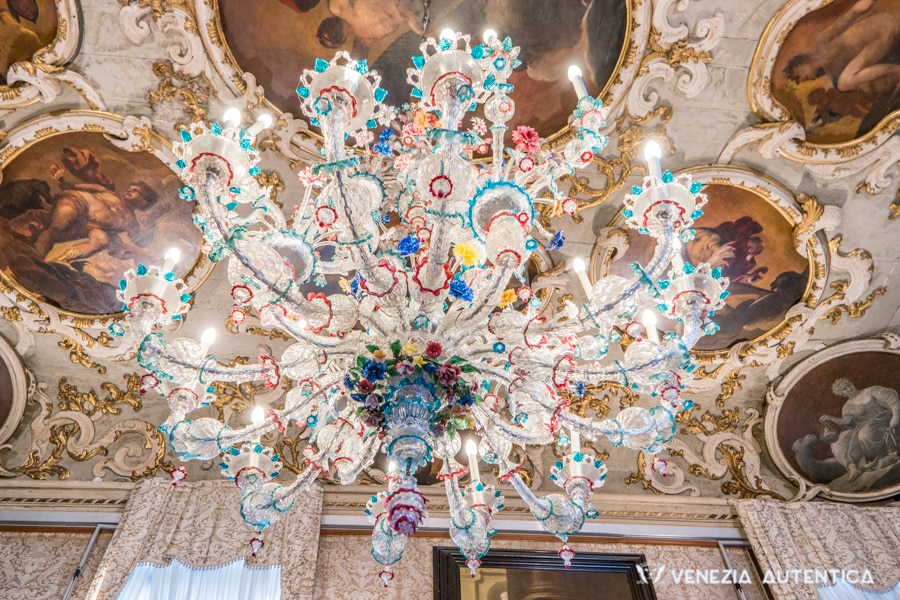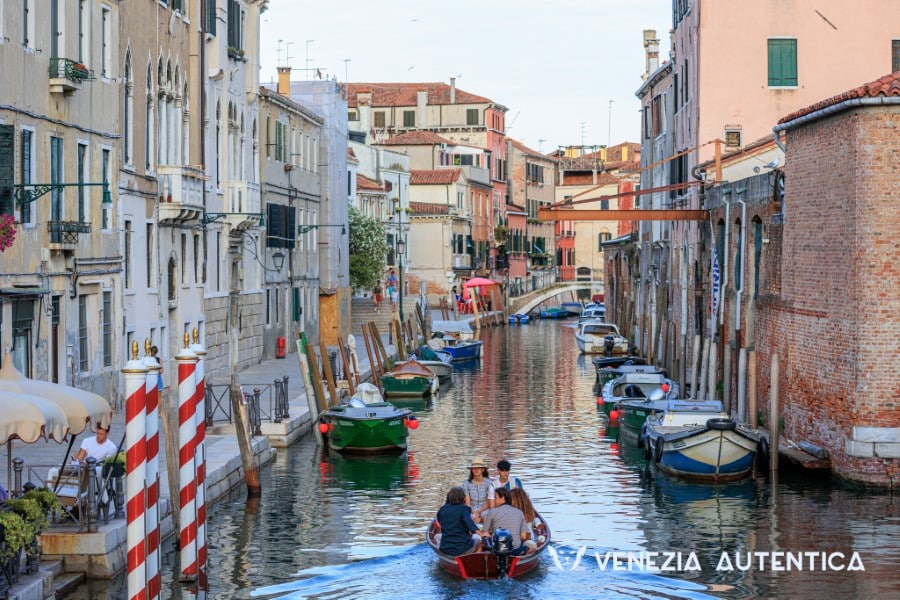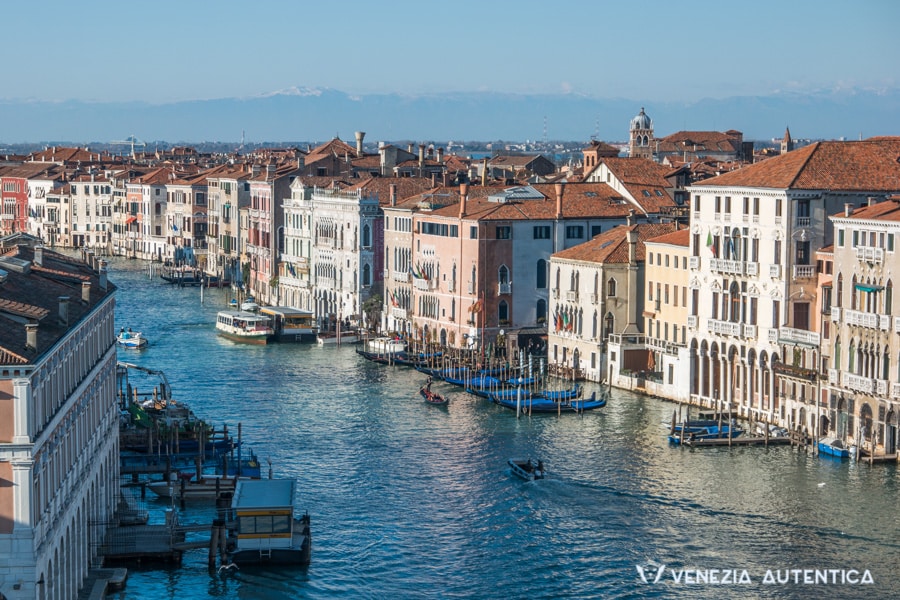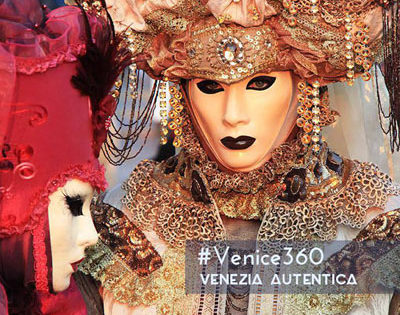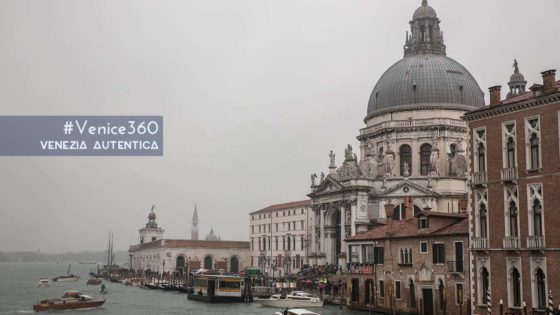The ``regate`` (singular ``regata``) are Venetian regattas or rowing races taking place in Venice since centuries
The “Voga Veneta” or Venetian rowing, is the traditional Venetian rowing technique in which rowers are standing up, facing forward and pushing the oar positioned on a “forcola” or oarlock.
“Regate“, regattas in English, are Voga Veneta races performed on traditional Venetian boats. The first regattas took place in Venice in 942 C.E., over a thousand years ago.
The Venetian rowing races are of two main 'types': the 'official' city regattas and the others
Regate can be divided in two major groups, those organized by the city municipality and those organized by the rowing clubs.
Every year there are a total of 8 “Regate Comunali” organized by the city municipality, which are considered to be “official“, while the number of non-official races is much greater.
The regattas are not always done the same way, the kind of crew and boat can vary from race to race

There are several types of “regate”, performed on different boats, with a different number of rowers. Typically to each regatta correspond one type of rowing boat and one type of crew. Rowers plan their races and organize their training according to the races calendar, adjusting their training to the kind of boats they will row and whom they will row them with.
Typical boats for “regate” are the “mascareta” for under-14 competitors and for women competitions, the “pupparino” for under-18 competitors, the “gondola” for one/two/four–men competitions and the “caorlina” for six-men competitions. It is only during the “Regata Storica“, the historical regatta that takes place every year on the Grand Canal, on the first Sunday of September, that men compete in a two-man race on “gondolini“, the fastest Venetian boat.
Non-official regattas might use different kind of boats and promote teams in which men, women, and teens are mixed.
The Regata's ritual: official or not Venetian rowing regattas generally follow a similar structure
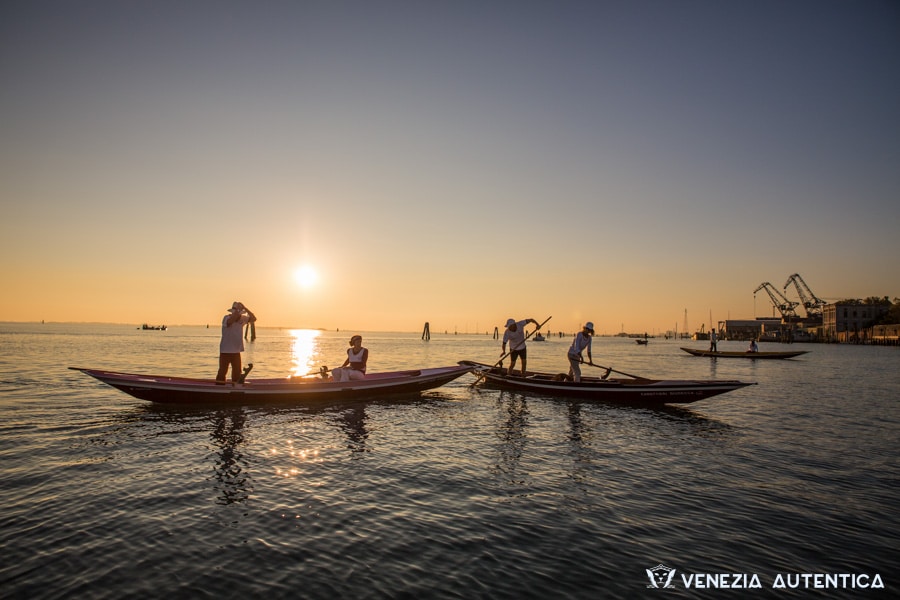
The organization of “Official” regattas is carried out with great shrewdness to guarantee transparency and fairness to all those taking part. The planning of non-official regattas can take into account all the measures created for the official competition and be highly competitive or, on the opposite side, be entirely set-up to even the differences between stronger competitors and less trained ones.
The typical fleet of a regata: same boats, different colours

The number of boats during “official” regate has to be between seven and nine. For every “type” of boat used in official competitions, the Venice municipality has at least ten standardised and identical versions. These standardised versions only differ from one another in the color (white, yellow, purple, blue, red,green, orange, rosa, brown, red&green), and are given to the rowers solely for the official competition and possible qualifiers.
Time qualifiers, the conquest of the right to enter an official regatta
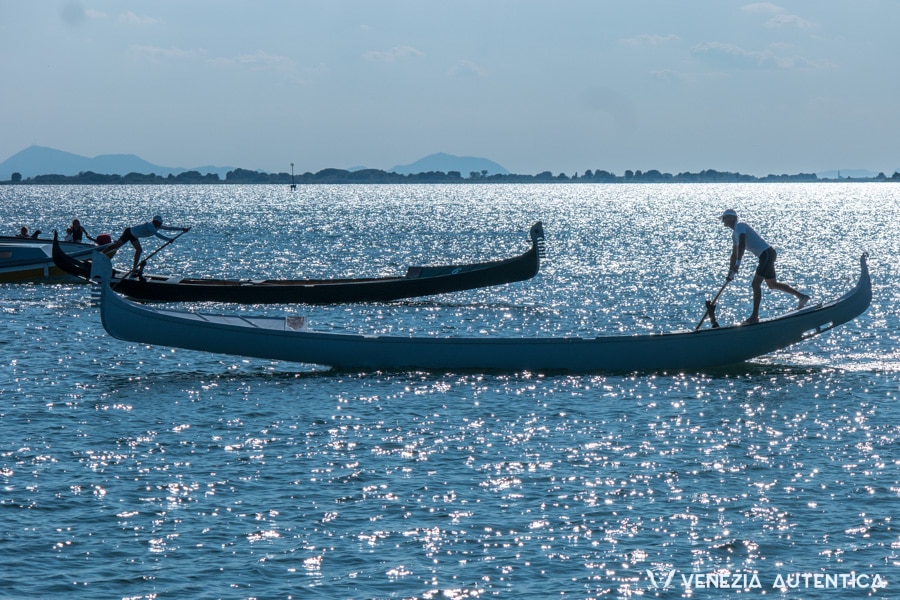
If more than nine teams want to take part in an official regatta, time qualifiers are held at Malamocco, Lido: every 60 seconds a team, on a standardised boat, starts rowing along the qualifiers track for 2,3 km (1,5km for women), turns around a floating mark, and rows back until the starting/finishing line. The nine fastest teams are qualified and take part in the “regata comunale“. The 10th team is assigned a red&green boat labeled with an “R”, the “reserve” boat and crew, in case one of the other participants fails to show up on the day of the race.
Non-official regattas tend to respect the seven-to-nine number of boats allowed to take part in a “regata”, but they can reach up to 50 boats all competing against each other!
Related: Watch the regata of the 50 caorline
The Venetian rowing races also have their track numbers

The water of the lagoon where a “regata” takes place might all look the same, but it is not. The depth of the water, possible currents, and the wind can greatly affect the performance of the rowers. Since the starting point of the regatta-field can play in favor or against the rowing teams, depending on which track position number they picked, participants to the race gather before every race to randomly draw their starting position.
No boats are the same, setting up properly does matter!

Every boat is different, and so is every rower. Once a boat is assigned to a team, the rower/s set up the boat, regulating their “forcola” or oarlock, fixing it with softwood wedges, and finally towing or rowing their boat to the regatta field.
No cheating! Lanyard and good faith on the starting line!

Before the start of every regatta, boats must align before the back judge can give the go-ahead. Sounds easy, right? Unfortunately, the natural current and the wind won’t help and will instead push some boats forward and some farther back, making the start a complicated (and loud!) moment for most “regate”!
To avoid great protests, the municipality make use of the “cordino”, or lanyard: the man closest to the stern of every boat must keep hold of a lanyard that is stretched perpendicular to the back of the boats.
Most regattas organized by clubs, however, don’t make use of the lanyard and count instead on the good nature of the competitors who try to start from the same line… sometimes it works immediately, other times it can take up to 15 minutes to!
Keeping your direction: Don't cut or be disqualified!
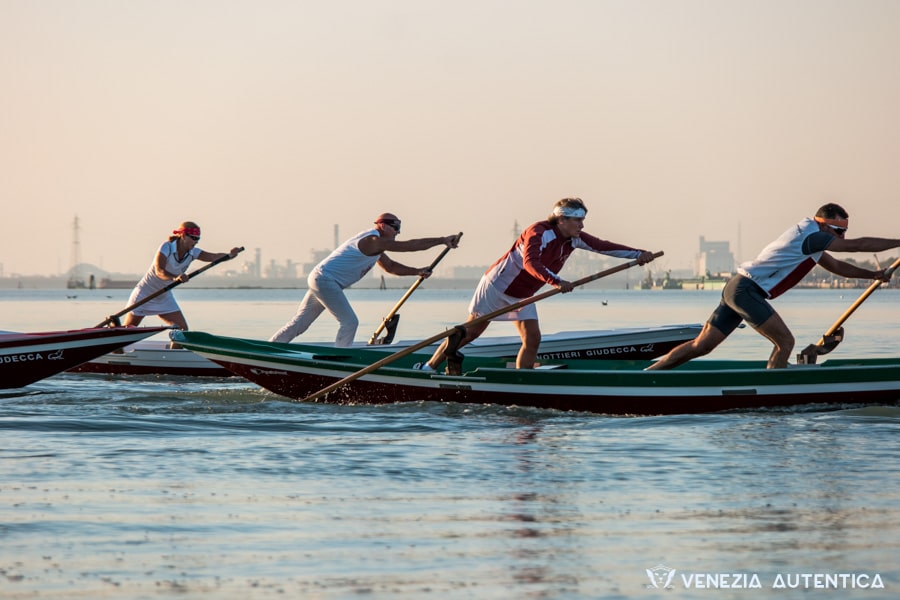
We already mentioned the drawing of the initial track position for every boat, and how this affects the performance of the team due to the depth of the water, the wind, and the currents.
Once the race has started, teams are allowed to chose a better path for their race, but only after the “cavata”, the first few hundred meters during which boats are still all competing side by side.
This is a necessary precaution taken to avoid oars hitting each other and hindering the performance of the other rowers.
With this same principle in mind, it is possible to overtake another boat only by moving wide away from it, known as “sorspasso al campo”, overcome it, and go back on the ideal track without hindering the opponent’s direction and speed.
The turn, often the turning point of a ``regata``
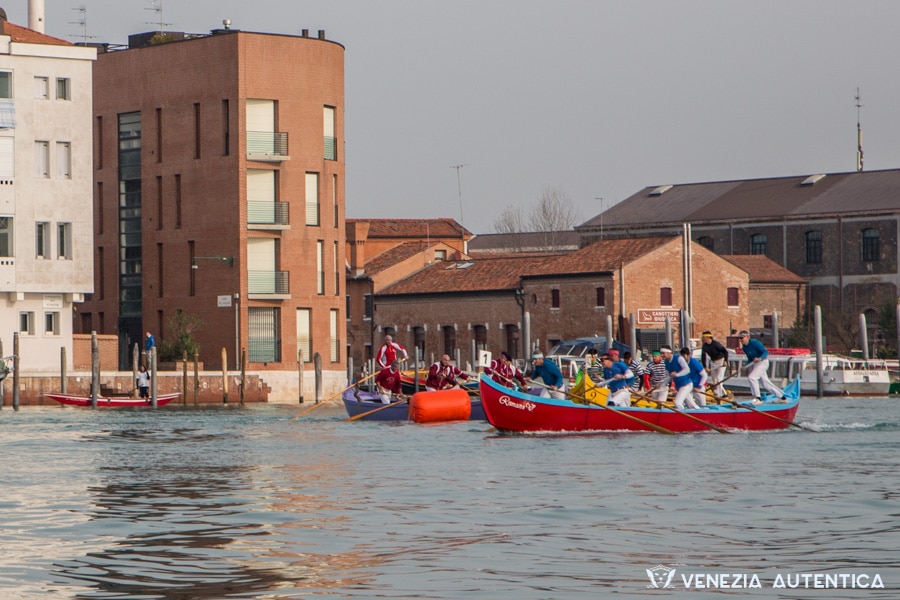
It is common for long regattas to have a pole halfway along the track. Boats must turn around this mark and proceed back in the opposite direction. It is forbidden to overtake boats while approaching the pole, in order to avoid crashes and the tangling up of the oars.
More Facts & Curiosities about the regate in Venice, Italy
You now know everything about how a regatta is organized and how it unwinds, but there is a few more curiosities you might want to know about…
The fourth gets no medal...

but a bright blue flag!
Actually, no rower gets any medal. The “voga veneta” rewards are not medals, but handmade flags that are assigned to every member of the first four boats.
The winning boat is awarded red flags, the second boat white flags, the third received green flags, and the fourth receives blue flags.
Red, white, green… do these colors remind you of any national flag?
Blue is the color of the Savoia family, the royal family that governed Italy before it became a Republic in 1946.
At the end, everybody put their oar in the air

During parades and at the end of races, rowers are happy to salute friends and relatives. Instead of yelling (there is plenty of that during many regatte!) or just waving their hands, rowers can slide their oars off the oarlock and lift it towards the sky, for a special and 5-meter big salute.
A pride of many: the great women wave
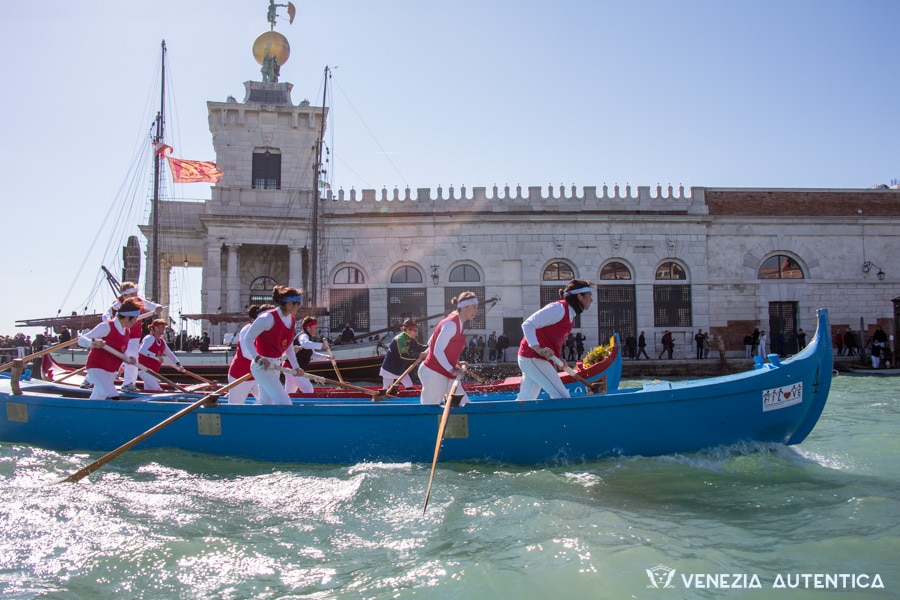
A great merit of the ancient Republic of Venice, is a great freedom, opportunity, and equality given to women. A degree of liberty that was far greater than in any other part of Europe. It comes therefore as no surprise, that at the time of the Serenissima, the best women rowers were authentic celebrities, on par with their male colleagues. Maria Boscolo da Marina, in particular, was a peasant of very humble origins who became a real legend thanks to her victories, and whose oil painting portrait can still be seen today at the Museo Correr in Saint Mark’s square.
The female participation in rowing and regatte faded for several decades after WWII, but in the past 10 years women are becoming every year more active, growing in number, strength and motivation every year, making the female rowers the greatest, and much needed, boom in the rowing world.
Considering the glorious past of female rowers and the great respect given to them by the Venetians and the government of the Serenissima, we are extremely saddened and embarrassed by the fact that, still in 2016, prizes of “official”, Statal, regattas are handed out in unfair ways. Women, in fact, are given prices whose value is 8 to 10 times lower than the value of those given to men.
Related: Women in the Republic of Venice
After the regata: all at the same table!

This aspect belongs primarily to all those (many) regattas organized by the clubs, rather than by the municipality. Competitors take part for winning, of course, but also for the fun itself and for taking part in something that is an essential aspect of the Venetian tradition, tied to the deepest roots of Venice itself: for many centuries, the best rowers have traditionally been fishermen living on the islands around Venice. Every morning fishermen and farmers were “racing” to reach the Rialto market before everyone else and beat the competition!
It is in this special atmosphere of joy (and of hunger after a physical activity that requires much energy) that it is very common for the participants to set up tables with great quantities of food and wine in the closest rowing club, usually the one that organised the regatta, and spend hours together eating, chatting and drinking.
“Regate” are a wonderful moment for competing, that often lead also to great moments of conviviality.
Funky regate: rowing races are not only about winning!
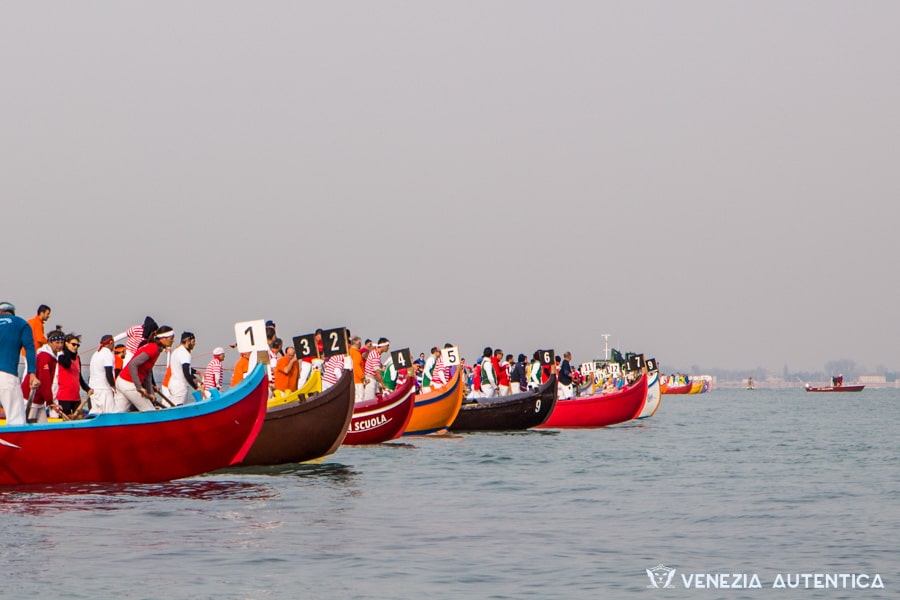
We mentioned the rigid structure, rules, and categories that define “official” regate created by the municipality. Official regate are competitions for the best venetian rowers, divided by gender and age, and as such only the strongest, most capable and trained athletes will take part to the qualifiers and possibly compete in the “regata comunale”.
Non-official regate can be very competitive and strict, or they can be held just for fun, or to give a chance also to those who are a bit older, not well trained or have just started rowing.
Some “regate” organized by clubs can be extremely fun to do and stunning or amusing to watch, so we thought of making a short list of those that we believe are the most amazing and entertaining to watch.
- “Regata delle 50 Caorline“: over 50 “caorline” boats, rowed by 6 people each, take part all at once in an epic regatta.
- “Regata del Secolo“: the sum of the ages of the two members of every boat must be equal or greater than 1 Century, or “Secolo”.
- “Regata della Befana“: every epiphany, on the 6th of January, rowers that are over 60 years old dress up as a “befana”, a sort of old whitch, and compete against each other on the Grand Canal.
- “Regata di Carnevale“: on carnival, every man&woman team choses combined carnival costumes and battles the opponents on Grand Canal. The victory goes to the team who gets the highest score by combining their ranking in the regatta and their ranking in the costume originality. The great costume maker Stefano Nicolao gives the ranking of the costumes.
- “Regata dei Babbi Natali“: in the beginning of december, rowers dress up as Santas and compete “alla valesana” (one person per boat, rowing with one oar on each side) on the Grand Canal.
- “Regata del Colesterolo“: the competition starts at a big table filled with delicious food and plenty of wine. The competitors eat and make sure their opponents glass and plates are never empty. Only after this very rich meal, the “cholesterol” regatta can begin!
- “Regata delle Donne“: every first sunday of march, six women on every “caorlina” compete in this beautiful regata that starts at giudecca and finishes at the Chiesa di Santa Maria della Salute, to celebrate the “International Women’s Day” which is on the 8th of March.
- “Regata delle Coppie nella vita“: good rowing partners know that it is necessary to discuss at times, just like in a couple… every team that is willing to take part in “Coppie nella Vita”, must be a couple also in life!
- “Remathlon“: Every team, made of six athletes, has to run, row, and then run again towards the finishing line. The team who first crosses the finishing line with four of its members wins.
I'm visiting Venice. Why should I follow your recommendations?
The way you visit Venice has an impact both on the quality of your experience and on Venice itself. Chilling, exploring, shopping, eating and drinking where the locals do, can make a huge impact both on the memories you bring home and on the local economy and community.
Home >> Venice and Venetians >> Venice Explained >> You’re Here
Facts, Curiosities, History of Venice, Italy
More about life in Venice, Italy

